- Home
- Blake Pierce
Murder (and Baklava) (A European Voyage Cozy Mystery—Book 1) Page 5
Murder (and Baklava) (A European Voyage Cozy Mystery—Book 1) Read online
Page 5
“I’ve never seen a suite this large on a boat,” London said.
“Yeah, but I’m not sure I’d want to honeymoon here,” Elsie said, pointing to a large portrait of Beethoven over the bed.
London gazed at the composer looking down with crossed arms and a frown of seeming disapproval. He didn’t look like he was in any mood for romance.
“I guess he was known for being cross and cantankerous,” she said.
“Yeah, well, there aren’t any pictures of Beethoven smiling and winking as if he’s purring ‘ooh-la-la.’”
As they went back into the hallway, Elsie said, “There are just two of those grand suites. Also some smaller suites and very elegant staterooms on this deck.”
London followed Elsie down more spiraling stairs to the next level—the Romanze deck. It had mid-sized staterooms that were named after other musical legends—Brahms, Bartok, Johann Strauss II, and even the Trapp Family Singers.
They looked into the lavish Habsburg Restaurant, where tables were perfectly set in preparation for the next meal, then back to the stairs and down another flight to the lowest level—the Allegro level.
The rooms here didn’t have any special names, and Elsie escorted London to a door with the number 110 on it. But when Elsie opened that door, London was startled to see where her own baggage had been left there for her.
“Oh, my!” London gasped. “The deckhand must have brought my bags to the wrong room!”
It was a single room, small but only slightly less luxurious than the suite she had viewed two decks above. It actually more impressive than some of the cheaper passenger quarters she’d seen on her ocean voyages.
Elsie took London by the arm with mock concern.
“London, sit down. I’ve got something to tell you that might cause you some alarm.”
She nudged London over to the bed and helped her sit there.
“I know this is going to come as a shock,” she said, “but the deckhand didn’t make a mistake, and you mustn’t faint or pass out or anything like that. This is your room. Yours and no one else’s.”
On the pillow beside her, London saw an information folder with her name on it, a room keycard, and an ID badge that read:
LONDON ROSE
SOCIAL DIRECTOR
“Oh, my!” London said again.
“Not quite like the old days, is it?”
“No, it’s certainly not,” London said, catching her breath.
Back when she and Elsie had worked together on cruise ships, they’d often been quartered in windowless rooms with bunk beds and two or three other hostesses.
This room had a queen bed and was decorated in shades of soft gray and blue. The narrow, high window gave her a very nice view.
“You’ve even got a private bath,” Elsie informed her. “With a shower.” She walked over to a closet and opened it. Several crew uniforms were hanging inside, with plenty of room left for all the clothes London had packed and any she might buy in European shops.
“You’d better get into these duds,” Elsie said, pointing to a uniform. “Passengers will be boarding in a half hour, and you’re supposed to be there to greet them.”
London went into the bathroom, washed up quickly, and changed into her own uniform—dark blue slacks with a blouse and vest. She fixed her makeup and combed her hair.
Elsie applauded when London emerged.
“Excellent!” she said. “You do that outfit proud!”
Before London could reply, there was a sharp knock at the door. Elsie opened it and a uniformed, dark-haired woman strode in.
Elsie sputtered, “London, this is Amy Blassingame, our concierge and—”
The woman interrupted, looking at her watch.
“I wish I could say it was a pleasure to meet you, Ms. Rose. But I’m afraid you’re already running late. Our passengers are ready to board right now. You’d better get up there and greet them—that is, if you hope to keep this job.”
Amy Blassingame held out a folder.
“You’ll need this,” she snapped. “Jot down everybody’s individual needs and demands next to their names, then leave the list in my box at the reception desk. I’ll take care of things from there.”
London took the folder and tried to utter a thank-you, but the woman whirled and left without another word.
For a moment, London just watched her go, stunned by the hostility she felt emanating from a complete stranger. A quick look at the folder revealed that it was a list of passenger names.
“Let’s go,” London said to Elsie. When they dashed into the hallway, Amy Blassingame was nowhere in sight.
“I thought you said I had a half hour,” London said as they as they got into the elevator.
“That’s what Amy said to tell you,” Elsie replied breathlessly. “Oh, London, I’d been meaning to warn you about Amy the River Troll. How did you get this job?”
“Jeremy Lapham called me personally. Just yesterday.”
“And what did he say?”
“That the position had opened unexpectedly.”
“That’s right,” Elsie said. “The woman they had signed up dropped out. I think she decided to elope with her Italian lover. Anyhow, Amy was expecting to get the job herself. She’s been fuming about it—and about you—all morning. Messing around with the boarding time is just her way …”
“But I didn’t—”
“I know, you didn’t mean to ruffle any feathers. But I’m afraid that Amy the River Troll has it in for you anyway. Just remember—you’re her boss, not the other way around. You might have trouble getting her to accept that, though.”
London’s heart sank a little. Wielding actual authority over resentful staff members was not something she’d learned how to do when she’d been a mere cruise ship hostess.
There sure are lots of new things to get used to, she realized.
Anyway, she was determined not to let a little river troll issue dampen her spirits.
When they arrived at the boarding area, London could see a line of passengers standing behind a chain on the far end of the covered gangway that led into the boat. She opened the glass doors of the reception room and waved at the deckhand who was in charge of that chain. At the sight of her signal, he lifted the barrier so the newcomers could board.
“Good luck,” Elsie whispered as she headed away.
London took a deep breath as the first passengers moved toward her.
Leading the group was a tiny, grim-looking, elderly woman. She was wearing unnecessary furs and enough jewelry to topple such a small person over. She was only carrying a large leather handbag, but an impressive pile of luggage followed her in the care of a deckhand.
Despite the woman’s dour expression, London smiled brightly and opened her mouth to welcome the very first guest to step into the Nachtmusik’s cheerful reception area.
Then London’s attention was captured by something strange about that handbag.
Long brown hair streamed down outside of it, as though the woman had rather carelessly stuffed a wig into it.
As London stared at that wig, she suddenly saw a pair of dark brown eyes pop open.
The wig was looking back at her.
CHAPTER SIX
The brown eyes blinked at London a couple of times. Then the bundle of hair lifted a little, revealing a shiny black nose. A set of bared teeth appeared below that, accompanied by a low growl.
Some kind of mechanical toy? London wondered.
Then the bundle of hair let out a sassy, yapping bark, confirming once and for all that the bundle of hair was neither a wig nor a toy. The tiny, elderly woman was carrying a very small dog in her handbag.
Is this going to be a problem? London wondered.
In the whirlwind of events that had brought her here overnight, nobody had told her anything about the policy for pets for this tour. She’d seen passengers with service animals while working on ocean-going lines, but it had never been her job to determine whether to allow
them aboard.
London managed to smile in her best professional manner.
“Welcome to Epoch World Cruise Lines’ very first tour of the beautiful Danube,” she said. “May I have your name?”
The woman glared at her grimly. Her face was extremely thin and extremely pale, but the irises of her spectacled eyes appeared to be solid black—much darker than the dog’s eyes.
“Surely you know that already,” she snapped, pointing to the folder in London’s hand. “You’ve got a passenger list right there.”
London was bewildered by the woman’s rather nonsensical logic.
“I still need you to tell me—” she began.
“And I’m telling you, you’ve got it right in front of you. I’ve got a reservation right here in the Menuetto deck in one of your finest staterooms—the Beethoven Grand Suite.”
I just looked at that suite, London realized.
She almost giggled at the memory of Beethoven’s portrait hanging over the bed. The great composer and this angry woman had much the same scowl. London thought the two might hit it off just fine.
Maybe they’ll spend the whole trip happily scowling at each other.
Anyway, this bit of information made it easier to find the woman’s name, which was Lillis Klimowski.
“We’re glad to have you joining us on the Nachtmusik, Ms.—”
“That’s Mrs. I’m tragically widowed, if you must know.”
“Mrs. Klimowski,” London said with a nod.
Before she could decide how to broach the question of the woman’s pet, an angry voice brought that subject up.
“You can’t bring a dog on board,” a man right behind Mrs. Klimowski complained loudly.
The middle-aged man was much bigger than Mrs. Klimowski. He was wearing plaid pants and was standing next to a buxom, gum-chewing woman with heavily dyed red hair.
“I beg your pardon,” Mrs. Klimowski replied sharply.
“You heard what I said,” the man said.
Mrs. Klimowski turned her nose up at him.
“I’ll have you know that Champion Sir Reginald Taft is no ordinary animal. He was a show champion in his youth—or so I was told when I purchased him. He’s officially my emotional support dog. We’re quite inseparable. Sometimes I think, if it weren’t for Sir Reginald, I’d go quite mad—especially when dealing with uncouth boors such as yourself, Mr. … what is your name, presumptuous fellow?”
The man linked his arms with the gum-chewing woman.
“We’re Mr. and Mrs. Gus Jarrett, and we’re on our honeymoon.”
London glanced at her list and saw that Gus and Honey Jarrett were booked into Trapp Family Singers room on the Romanze deck, one level down. They looked to London as though this was far from the first honeymoon either of them had been on. She guessed that they both might have gone through a fair number of spouses by now.
Then another couple stepped out of line to have a look at the dog. They were a kindly-looking pair of pudgy elderly people. The woman was allowing the dog to sniff her hand.
“Oh, but look at this adorable creature, Walter!” she said.
“He’s very cute indeed, Agnes,” her husband said.
London glanced down the list and found the names of Walter and Agnes Shick, who were booked into the Johann Strauss II suite on the Menuetto deck.
The couple’s admiration seemed to improve the dog’s mood a little. Still held tightly in the leather handbag, Sir Reginald Taft actually allowed Agnes Shick to scratch him under the chin without snapping her finger off.
But Gus Jarrett was seething now.
“I’ll have you know that my lovely bride is allergic to dogs!” he said.
His gum-chewing wife gave him an odd look, as if this was news to her. London felt sure that Gus was inventing Honey’s allergy just to make trouble. Anyway, they were quartered a deck below Mrs. Klimowski’s suite, so surely allergies didn’t have to be an issue. All they had to do was maintain a reasonable distance from the dog.
Still scratching Sir Reginald, Agnes Shick looked at Gus and Honey with a smile.
“You needn’t worry about allergies,” she said.
“Indeed you don’t,” Walter Shick added. “This is a Yorkshire Terrier. The breed is hypoallergenic.”
“Hypo-what?” demanded Gus Jarrett.
“Hypoallergenic,” Agnes repeated. “This lovely mane of his is more like human hair than animal fur. He won’t cause your wife any more allergic problems than … well, than I would, or Walter, or any other person here.”
Agnes had stopped scratching the dog, and the animal growled again in London’s direction, looking as irritable as before.
Why does that dog keep growling at me? she wondered.
At least London was relieved that Sir Reginald wasn’t going to be a health hazard to any passengers who might have allergies.
Meanwhile, the boarding line was getting longer by the minute, and passengers were beginning to look impatient that things were stalled. And London still didn’t know how to handle the unexpected animal. She tried to remember what she’d been told about support animals by people she’d known in other parts of the travel industry.
“Do you have any paperwork on Sir Reginald?” she asked Mrs. Klimowski.
“Paperwork? Why on earth would he require any paperwork?”
“My understanding is that passengers are usually expected to have a letter from a therapist or a medical professional, something to certify the need for an emotional support animal. Do you have a letter like that?”
“Do I have it? Of course I have it! I already filed it with your company!”
London glanced at the passenger list again to make absolutely sure that there was no mention of a support animal by Mrs. Klimowski’s name.
“Perhaps you could show it to me again,” London said with a polite smile.
“Show it to you again! I think not! I’m through dealing with an underling like yourself. I demand to see the social director for this tour.”
“That would be me,” London replied firmly.
Mrs. Klimowski’s eyes widened.
“I find that very hard to believe!” she said.
London realized that her own smile was getting a bit stiff as she displayed the badge on her uniform—the one that identified her as “London Rose, Social Director.”
“I’m sorry if I’m not quite the person you expected,” she said with exaggerated courtesy. “But I promise to fix this problem right away, and to do my very best to make the rest of your voyage a happy one.”
Mrs. Klimowski looked thoroughly unappeased.
“I must be on my way before I lose my temper,” she said. “You may speak to me when you’ve resolved this issue. You will find me in my grand suite.”
She turned and stalked away, with the deckhand lugging her luggage along behind her. As the woman disappeared into the corridor that led to the staterooms, the dog looked back at London and growled again.
Again she wondered why that dog seemed to dislike her so.
But Sir Reginald was probably here to stay. London really couldn’t imagine that anybody was going to pry Mrs. Klimowski and Sir Reginald Taft out of the Beethoven suite.
Meanwhile, the line of passengers waiting to board had gotten dauntingly long. Most of the one hundred or so booked for the trip seemed to be arriving right now. But Agnes Shick was still standing close to London with an expression of concern.
“Surely there’s no reason not to let that adorable dog on board,” she said.
“I hope not,” London admitted.
Walter Shick gestured toward London’s passenger list.
“Does the list say where Mrs. Klimowski is from?” he asked.
It hadn’t occurred to London to check.
“She’s from Port Mather, in Long Island,” London said.
“Well, that makes things simpler, doesn’t it?” Agnes said.
“She must have flown with the dog when she came over,” Walter added. “
If so, she surely really must have a certification letter, or it wouldn’t have been allowed on the plane. Does it really matter if she can’t produce it just this minute?”
London smiled with relief at the suggestion. She wouldn’t have to challenge Mrs. Klimowski after all. She could just ask the woman to produce the letter sometime later.
“Welcome aboard,” she said to Walter and Agnes Shick. “And thanks so much for your help.”
“I’m glad if we’ve fixed things for the dog,” Walter said. “Too bad we have to let that woman aboard though …”
Agnes poked her husband in the ribs.
“Now, Walter, is that a nice thing to say? Without Mrs. Klimowski along, who would be here to take care of Sir Reginald?”
London thanked the couple again, and they headed up the gangway.
The next passenger in line was a tall, black-clad man with thick black hair and an icy expression. London felt a chill just from looking at him. It was easy to imagine him as a young undertaker.
“Welcome to Epoch World Cruise Lines’ very first tour of the beautiful Danube,” she said. “May I have your name?”
“Cyrus Bannister,” he said. “I believe you’ll find me booked into the Schoenberg Suite.”
Then with a smirk he added, “I’m sure I’m the only person who wanted it.”
It took London a second to get the joke. She’d never listened to much Schoenberg, but she hadn’t liked what she’d heard. It was too strange and dissonant for her tastes. She figured many other people probably felt the same way.
But maybe Cyrus Bannister liked things to be strange and dissonant.
He said to London, “I couldn’t help noticing your altercation with that woman. I’m afraid she’s going to be, shall we say, high maintenance. I hope she won’t give you too much trouble.”
“Oh, no trouble at all,” London said diplomatically.
Then, glancing toward the boat, she added, “I don’t know what to think of her dog, though.”
“Why is that?”
“Well, he doesn’t seem to like me. He keeps growling at me.”
Cyrus Bannister’s lips twisted into a peculiar grin.

_preview.jpg) Once Gone (a Riley Paige Mystery--Book #1)
Once Gone (a Riley Paige Mystery--Book #1) Left to Hunt (An Adele Sharp Mystery—Book Nine)
Left to Hunt (An Adele Sharp Mystery—Book Nine) Left to Kill (An Adele Sharp Mystery—Book Four)
Left to Kill (An Adele Sharp Mystery—Book Four)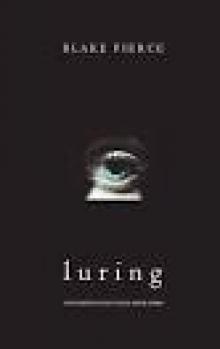 LURING
LURING If She Hid
If She Hid If She Fled
If She Fled Already Gone (A Laura Frost FBI Suspense Thriller—Book 1)
Already Gone (A Laura Frost FBI Suspense Thriller—Book 1) Vengeance in Vienna
Vengeance in Vienna Once Shunned
Once Shunned Left To Run
Left To Run Face of Fury (A Zoe Prime Mystery--Book 5)
Face of Fury (A Zoe Prime Mystery--Book 5) Blake Pierce - Kate Wise - 5 - If She Fled
Blake Pierce - Kate Wise - 5 - If She Fled IF SHE RAN
IF SHE RAN Left to Envy (An Adele Sharp Mystery—Book Six)
Left to Envy (An Adele Sharp Mystery—Book Six) Silent Neighbor
Silent Neighbor Her Last Wish (A Rachel Gift FBI Suspense Thriller—Book 1)
Her Last Wish (A Rachel Gift FBI Suspense Thriller—Book 1) Almost Lost
Almost Lost Before He Harms
Before He Harms Murder (and Baklava) (A European Voyage Cozy Mystery—Book 1)
Murder (and Baklava) (A European Voyage Cozy Mystery—Book 1) Left to Vanish (An Adele Sharp Mystery—Book Eight)
Left to Vanish (An Adele Sharp Mystery—Book Eight) THE PERFECT IMAGE
THE PERFECT IMAGE The Perfect Affair (A Jessie Hunt Psychological Suspense Thriller—Book Seven)
The Perfect Affair (A Jessie Hunt Psychological Suspense Thriller—Book Seven) Left To Die
Left To Die BEFORE HE LAPSES
BEFORE HE LAPSES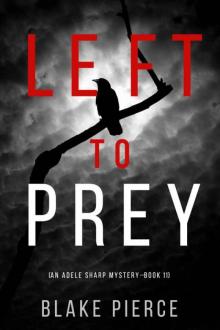 Left to Prey (An Adele Sharp Mystery—Book Eleven)
Left to Prey (An Adele Sharp Mystery—Book Eleven) The Perfect Neighbor (A Jessie Hunt Psychological Suspense Thriller—Book Nine)
The Perfect Neighbor (A Jessie Hunt Psychological Suspense Thriller—Book Nine) Almost Dead
Almost Dead The Perfect Wife
The Perfect Wife The Perfect Smile
The Perfect Smile If She Saw
If She Saw Left To Die (An Adele Sharp Mystery—Book One)
Left To Die (An Adele Sharp Mystery—Book One) City of Prey: An Ava Gold Mystery (Book 1)
City of Prey: An Ava Gold Mystery (Book 1)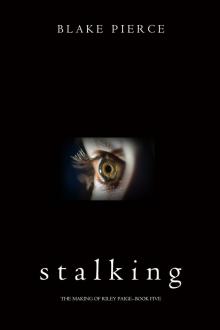 Stalking
Stalking Face of Darkness (A Zoe Prime Mystery—Book 6)
Face of Darkness (A Zoe Prime Mystery—Book 6) The Perfect Mistress (A Jessie Hunt Psychological Suspense Thriller—Book Fifteen)
The Perfect Mistress (A Jessie Hunt Psychological Suspense Thriller—Book Fifteen) Girl, Vanished (An Ella Dark FBI Suspense Thriller—Book 5)
Girl, Vanished (An Ella Dark FBI Suspense Thriller—Book 5) The Perfect Block
The Perfect Block Left to Fear (An Adele Sharp Mystery—Book Ten)
Left to Fear (An Adele Sharp Mystery—Book Ten) Almost Gone (The Au Pair—Book One)
Almost Gone (The Au Pair—Book One) The Perfect Facade (A Jessie Hunt Psychological Suspense Thriller—Book Twelve)
The Perfect Facade (A Jessie Hunt Psychological Suspense Thriller—Book Twelve) The Perfect Affair
The Perfect Affair Once Chosen (A Riley Paige Mystery—Book 17)
Once Chosen (A Riley Paige Mystery—Book 17) Girl, Alone (An Ella Dark FBI Suspense Thriller—Book 1)
Girl, Alone (An Ella Dark FBI Suspense Thriller—Book 1) Face of Murder (A Zoe Prime Mystery—Book 2)
Face of Murder (A Zoe Prime Mystery—Book 2) The Perfect Mistress
The Perfect Mistress Crime (and Lager) (A European Voyage Cozy Mystery—Book 3)
Crime (and Lager) (A European Voyage Cozy Mystery—Book 3) Before He Harms (A Mackenzie White Mystery—Book 14)
Before He Harms (A Mackenzie White Mystery—Book 14) Face of Fear
Face of Fear Left to Murder (An Adele Sharp Mystery—Book Five)
Left to Murder (An Adele Sharp Mystery—Book Five) Left to Vanish
Left to Vanish The Perfect Secret (A Jessie Hunt Psychological Suspense Thriller—Book Eleven)
The Perfect Secret (A Jessie Hunt Psychological Suspense Thriller—Book Eleven) The Perfect Deceit (A Jessie Hunt Psychological Suspense Thriller—Book Fourteen)
The Perfect Deceit (A Jessie Hunt Psychological Suspense Thriller—Book Fourteen) Blake Pierce - The Making of Riley Paige - 4 - Taking
Blake Pierce - The Making of Riley Paige - 4 - Taking Death (and Apple Strudel) (A European Voyage Cozy Mystery—Book 2)
Death (and Apple Strudel) (A European Voyage Cozy Mystery—Book 2) THE PERFECT HOUSE
THE PERFECT HOUSE Cause to Save
Cause to Save Face of Fear (A Zoe Prime Mystery—Book 3)
Face of Fear (A Zoe Prime Mystery—Book 3)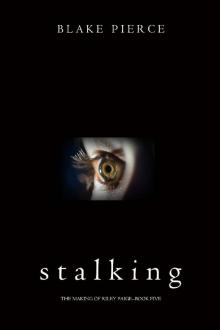 Stalking (The Making of Riley Paige—Book 5)
Stalking (The Making of Riley Paige—Book 5) A Neighbor's Lie
A Neighbor's Lie The Perfect Neighbor
The Perfect Neighbor Once Dormant
Once Dormant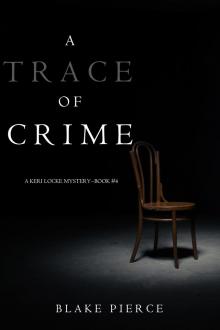 A Trace of Crime
A Trace of Crime CAUSE TO DREAD
CAUSE TO DREAD Already Missing (A Laura Frost FBI Suspense Thriller—Book 4)
Already Missing (A Laura Frost FBI Suspense Thriller—Book 4) Waiting
Waiting If She Knew
If She Knew If She Feared (A Kate Wise Mystery—Book 6)
If She Feared (A Kate Wise Mystery—Book 6) Left To Run (An Adele Sharp Mystery—Book Two)
Left To Run (An Adele Sharp Mystery—Book Two)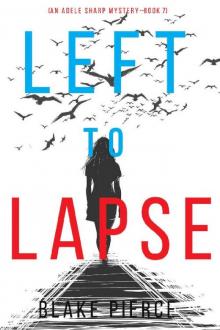 Left to Lapse (An Adele Sharp Mystery—Book Seven)
Left to Lapse (An Adele Sharp Mystery—Book Seven) If She Hid (A Kate Wise Mystery—Book 4)
If She Hid (A Kate Wise Mystery—Book 4) The Perfect Alibi (A Jessie Hunt Psychological Suspense Thriller—Book Eight)
The Perfect Alibi (A Jessie Hunt Psychological Suspense Thriller—Book Eight) Once Taken
Once Taken Before He Envies
Before He Envies Before He Sins
Before He Sins Mackenzie White 07-Before He Sins
Mackenzie White 07-Before He Sins ONCE BOUND
ONCE BOUND Once Buried
Once Buried Waiting (The Making of Riley Paige—Book 2)
Waiting (The Making of Riley Paige—Book 2) Riley Paige 11-Once Buried
Riley Paige 11-Once Buried Once Forsaken (A Riley Paige Mystery—Book 7)
Once Forsaken (A Riley Paige Mystery—Book 7) Once Stalked (A Riley Paige Mystery—Book 9)
Once Stalked (A Riley Paige Mystery—Book 9) The Perfect Disguise (A Jessie Hunt Psychological Suspense Thriller—Book Ten)
The Perfect Disguise (A Jessie Hunt Psychological Suspense Thriller—Book Ten)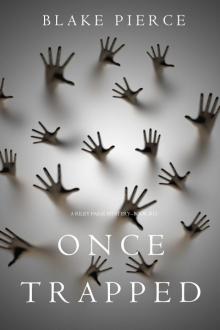 ONCE TRAPPED
ONCE TRAPPED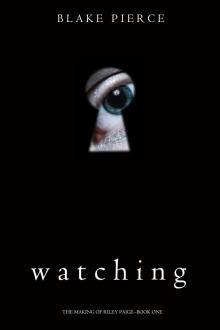 Watching
Watching Keri Locke 02-A Trace of Muder
Keri Locke 02-A Trace of Muder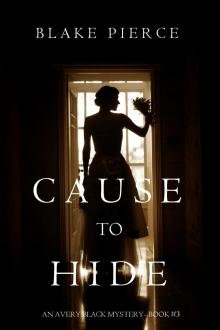 Cause to Hide
Cause to Hide Once Hunted
Once Hunted Cause to Kill (An Avery Black Mystery—Book 1)
Cause to Kill (An Avery Black Mystery—Book 1) Before He Preys
Before He Preys Once Pined
Once Pined A Trace of Hope
A Trace of Hope Once Craved (a Riley Paige Mystery--Book #3)
Once Craved (a Riley Paige Mystery--Book #3) Once Lured
Once Lured Before He Sees (A Mackenzie White Mystery—Book 2)
Before He Sees (A Mackenzie White Mystery—Book 2) Before he Kills (A Mackenzie White Mystery—Book 1)
Before he Kills (A Mackenzie White Mystery—Book 1) Keri Locke 03-A Trace of Vice
Keri Locke 03-A Trace of Vice Once Cold
Once Cold ONCE LOST
ONCE LOST Before He Takes
Before He Takes Before He Covets (A Mackenzie White Mystery—Book 3)
Before He Covets (A Mackenzie White Mystery—Book 3) BEFORE HE NEEDS
BEFORE HE NEEDS